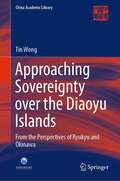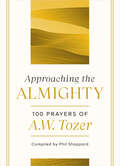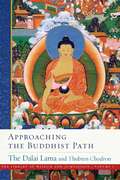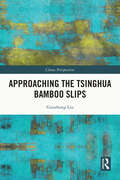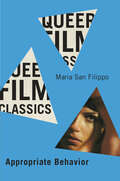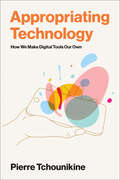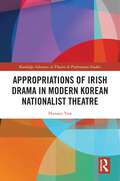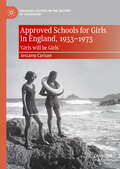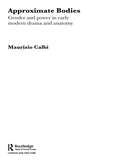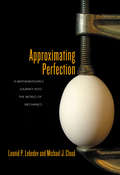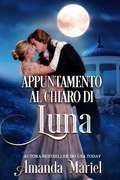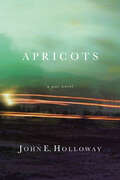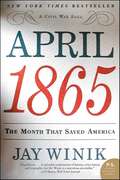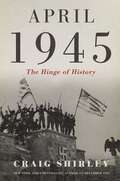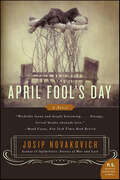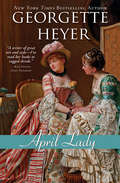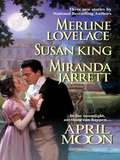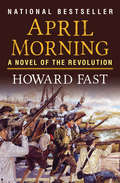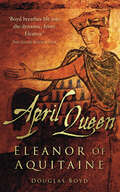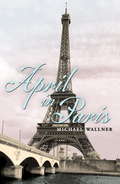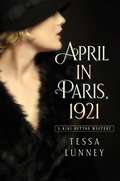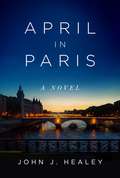- Table View
- List View
Approaching Sovereignty over the Diaoyu Islands: From the Perspectives of Ryukyu and Okinawa (China Academic Library)
by Tin WongThis book discusses the sovereignty over the Diaoyu Islands from the perspectives of Ryukyu and Okinawa. Written in chronological order, the book has 13 chapters featuring 121 documents and maps. The first 12 chapters explain, based on detailed historical facts on the Diaoyu Islands, the rise and decline of the Ryukyu Kingdom and the historical roles of China, Japan, and the United States in the history of the kingdom. The final chapter is an overview of the Sino-Ryukyuan, Japan-Ryukyuan and US-Ryukyuan relations, and further clarifies the issue of ownership of the Diaoyu Islands and their strategic position. The book demonstrates that Ryukyu did not have sovereignty over the Diaoyu Islands, refutes Japan’s claim that these islands were a part of the Ryukyu Kingdom, and reveals the causes and consequences of the Sino-Japanese conflicts created by the United States. The book examines the 500-year friendship between China and Ryukyu, recounting moving stories. Lastly, citing ancient documents and more, the books proves that the Ryukyus never owned the Diaoyu Islands and that these islands belong to China.
Approaching the Almighty: 100 Prayers of A. W. Tozer
by A. W. TozerDiscover the never-before-published prayers of A. W. Tozer as he opens his sermons.Is there a holier moment than when a preacher steps into the pulpit and opens the Scriptures before the people of the Lord? A. W. Tozer certainly understood the gravity and sanctity of that moment. His pulpit prayers reflect the holy awe that he experienced as he stood before God and the gathered congregation.Although Tozer fans are familiar with his writings and sermons, now for the first time, Approaching the Almighty collects the prayers that Tozer offered as he stepped into the pulpit to preach. Phil Shappard, a Moody Radio manager whose job was to remaster the audiotapes of Tozer&’s sermons, has collected and transcribed almost two hundred prayers that reveal the great preacher&’s intimate walk with God.The path to a rich prayer life is to pray alongside others whose faith is deep. Let Tozer&’s pulpit prayers guide your own heart in its steadfast pursuit of God.
Approaching the Almighty: 100 Prayers of A. W. Tozer
by A. W. TozerDiscover the never-before-published prayers of A. W. Tozer as he opens his sermons.Is there a holier moment than when a preacher steps into the pulpit and opens the Scriptures before the people of the Lord? A. W. Tozer certainly understood the gravity and sanctity of that moment. His pulpit prayers reflect the holy awe that he experienced as he stood before God and the gathered congregation.Although Tozer fans are familiar with his writings and sermons, now for the first time, Approaching the Almighty collects the prayers that Tozer offered as he stepped into the pulpit to preach. Phil Shappard, a Moody Radio manager whose job was to remaster the audiotapes of Tozer&’s sermons, has collected and transcribed almost two hundred prayers that reveal the great preacher&’s intimate walk with God.The path to a rich prayer life is to pray alongside others whose faith is deep. Let Tozer&’s pulpit prayers guide your own heart in its steadfast pursuit of God.
Approaching the Buddhist Path
by His Holiness the Dalai Lama Chodron ThubtenThe first volume in a multi-volume collection presenting the Dalai Lama’s comprehensive explanation of the Buddhist path.His Holiness the Dalai Lama has been publicly teaching Buddhism for decades. This series collects his presentations of every step of the path to enlightenment, compiled and coauthored by one of his chief Western disciples, the American nun Thubten Chodron. The Buddha wanted his students to investigate, to see for themselves whether what he said were true. As a student of the Buddha, the Dalai Lama promotes the same spirit of investigation, and as the rich tradition of the Buddha makes its way into new lands and cultures, His Holiness has recognized that new approaches are needed to allow seekers in the West to experience the relevance of the liberating message in their own lives. Such an approach cannot assume listeners are free from doubt and already have faith in Buddhism’s basic tenets. The Library of Wisdom and Compassion series, therefore, starts from the universal human wish for happiness and presents the dynamic nature of the mind. This first volume also provides a wealth of reflections on Buddhist history and fundamentals, contemporary issues, and the Dalai Lama’s own personal experiences. It stands alone as an introduction to Buddhism, but it also provides a foundation for the systematic illumination of the path in the volumes to come. The Library of Wisdom and Compassion collects the Dalai Lama’s decades of presentations of every step of the path to enlightenment. It has been compiled and coauthored by one of his chief Western disciples, the American nun Thubten Chodron.
Approaching the Tsinghua Bamboo Slips (ISSN)
by Guozhong LiuThis book provides a detailed introduction to the study of the Tsinghua Bamboo Slips, explaining the preservation and analysis of the artifacts and their significance in historical research of the pre-Qin period.The Tsinghua Bamboo Slips are a collection of Chinese texts inscribed on approximately 2,500 bamboo slips. They were excavated from a Warring States Period tomb and are now preserved at Tsinghua University. The book delves into the traditions and discoveries of bamboo manuscripts in China and discusses the preservation and research of the slips, covering the procedures of artifact processing, authentication, digitization, editing, and interpretation. The manuscripts are remarkable for their quantity, period of creation, and distinctive content coverage. They contain important historical documents that differ from or are missing from the extant literature. The analysis of these texts helps to unravel some of the unresolved mysteries in pre-Qin historical studies and illuminates scientific achievements of ancient China previously unknown to the world.This book is essential reading for scholars and students of Chinese studies, pre-Qin history, and early literacy. It will also appeal to general readers interested in ancient Chinese history and culture.
Appropriate Behavior (Queer Film Classics)
by Maria San FilippoPremiering at Sundance in 2014, Desiree Akhavan’s acclaimed debut feature, Appropriate Behavior, introduced the indie film world to the deadpan, irreverent wit that had already won over fans of her trailblazing LGBTQ web series The Slope. The first volume in the Queer Film Classics series to spotlight a work by and about a bisexual woman of colour, this book explores Appropriate Behavior as an instant classic of US indie filmmaking in the 2010s, as a radical reappropriation of straight and gay film genres, as an artist’s coming-of-age story, and as a model for feminist-queer creative collaboration. Less than a decade old, Appropriate Behavior captures an urban queer community imperilled by gentrification and homonormativity and serves as exemplar of an innovative wave of independent cinema not yet subsumed by the streaming economy. Maria San Filippo explores how filmmaker and film render a singular voice and story that queers not only its celebrated romcom predecessors but also the gay coming-out film and the lesbian romance alike. The book concludes with an interview with Akhavan.San Filippo pays special tribute to Akhavan’s audacious sensibility and the “inbetweener” moxie that makes Appropriate Behavior an unparalleled portrayal of bisexuality.
Appropriated Interiors
by Anca I. Lasc Deborah Schneiderman Karin TehveAppropriated Interiors uncovers the ways interiors participate explicitly and implicitly in embedded cultural and societal values and explores timely emergent scholarship in the fields of interior design history, theory, and practice. What is "appropriate" and "inappropriate" now? These are terms with particular interest to the study of the interior. Featuring thirteen original curated essays, Appropriated Interiors explores the tensions between normative interiors that express the dominant cultural values of a society and interiors that express new, changing, and even transgressive values. With case studies from the late eighteenth century to the twenty-first century, these historians, theorists, and design practitioners investigate the implications of interior design as it relates to politics, gender, identity, spatial abstraction, cultural expression, racial expression, technology, and much more. An informative read for students and scholars of design history and theory, this collection considers the standards, assumptions, codes, and/or conventions that need to be dismantled and how we can expand our understanding of the history, theory, and practice of interior design to challenge the status quo.
Appropriating Technology: How We Make Digital Tools Our Own (Acting with Technology)
by Pierre TchounikineHow we use digital technologies and make them our own.Appropriation is the process by which we turn digital technologies into instruments for our own use. Since we do not use technologies but rather our appropriations of them, understanding why and how these appropriations develop is important and useful for both users and for designers. However, appropriation is an underexplored aspect of human-computer interaction. In Appropriating Technology, Pierre Tchounikine explains that appropriation is constitutive of how we actually use things in practice and is different in nature from the initial process of learning to use a technology.He provides an analysis of the phenomena at play and explains how the way we develop (we evolve, we learn) is key, how our human high-level needs also play an important (though often unconscious) role, how the current adaptation means offered by most technologies give us some degree of freedom to align technologies to our needs and desires (although they are far from fully satisfactory), and how these design aspects may be improved.
Appropriations of Irish Drama in Modern Korean Nationalist Theatre (Routledge Advances in Theatre & Performance Studies)
by Hunam YunThis book investigates the translation field as a hybrid space for the competing claims between the colonisers and the colonised. By tracing the process of the importation and appropriation of Irish drama in colonial Korea, this study shows how the intervention of the competing agents – both the colonisers and the colonised – formulates the strategies of representation or empowerment in the rival claims of the translation field. This exploration will be of great interest to students and scholars of theatre and performance studies, translation studies, and Asian studies.
Approved Schools for Girls in England, 1933-1973: ‘Girls will be Girls’ (Palgrave Studies in the History of Childhood)
by Jessamy CarlsonThis book provides a detailed study of approved schools for girls, which operated in England and Wales between 1933-1973. Through original archival research, it traces shifting perceptions of, and policy responses to, girls’ delinquency and vulnerability during a period of remarkable social change. It examines the transition of provision for girls and young women 'in trouble' from the large-scale post-Victorian reformatories to the therapeutic Community Homes for Education, and the emergence of a 'diagnostic shift' in the provision of care for children in the juvenile secure estate. Through examining the experiences of younger children, it provides a more nuanced understanding of the role approved schools played for girls in need of care, protection, or control during this period, evidencing the gendered use of care-or-protection orders throughout, and the policing of child and family behaviours under the guises of the Education Act.
Approximate Bodies: Gender and Power in Early Modern Drama and Anatomy
by Maurizio CalbiThe early modern period was an age of anatomical exploration and revelation, with new discoveries capturing the imagination not only of scientists but also of playwrights and poets. Approximate Bodies examines, in fascinating detail, the changing representation of the body in early modern drama and in the period's anatomical and gynaecological treatises. Maurizio Calbi focuses on the unstable representation of both masculinity and femininity in Renaissance texts such as The Duchess of Malfi, The Changeling and a variety of Shakespeare plays. Drawing on theorists including Foucault, Derrida and Lacan, these close textual readings examine the effects of social, psychic and cultural influences on early modern images of the body. Calbi identifies the ways in which political, social, racial and sexual power structures effect the construction of the body in dramatic and anatomical texts. Calbi's analysis displays how images such as the deformed body of the outsider, the effeminate body of the desiring male and the disfigured body parts of the desiring female indicate an unstable, incomplete conception of the body in the Renaissance. Compelling and impeccably researched, this is a sophisticated account of the fantasies and anxieties that play a role in constructing the early modern body. Approximate Bodies makes a major contribution to the field of early modern studies and to debates around the body.
Approximating Perfection
by Leonid P. Lebedev Michael J. CloudThis is a book for those who enjoy thinking about how and why Nature can be described using mathematical tools. Approximating Perfection considers the background behind mechanics as well as the mathematical ideas that play key roles in mechanical applications. Concentrating on the models of applied mechanics, the book engages the reader in the types of nuts-and-bolts considerations that are normally avoided in formal engineering courses: how and why models remain imperfect, and the factors that motivated their development. The opening chapter reviews and reconsiders the basics of calculus from a fully applied point of view; subsequent chapters explore selected topics from solid mechanics, hydrodynamics, and the natural sciences. Emphasis is placed on the logic that underlies modeling in mechanics and the many surprising parallels that exist between seemingly diverse areas. The mathematical demands on the reader are kept to a minimum, so the book will appeal to a wide technical audience.
Appuntamento al chiaro di luna
by Amanda Mariel Sara MinerviniLady Tabitha Pemberton non desidera altro che godersi la sua prima Stagione londinese senza preoccuparsi di trovare un marito. Ma quando la fantomatica Lady X scrive, nella sua rubrica di pettegolezzi, dell’incontro proibito tra Tabitha e Colin Brooks, conte di Harcourt, tutto cambia. Ora Tabitha è costretta a scegliere tra la sua reputazione e la volontà di non contrarre legami almeno per un altro anno ancora. Un breve racconto divertente, romantico e con un pizzico di mistero firmato da una delle regine del romance.
Apricots: A War Novel
by John E Holloway John HollowayLieutenant Robert Forrest joined the Marines because his father was a Marine. His whole life he felt the pull of patriotism rooted in his Marine Corps upbringing. But after the Vietnam war, he doubts the Country he&’s sworn to serve. The collapse of the Republic of Vietnam in 1975 confirmed defeat of the U.S. – and the wasted sacrifice of 58,000 American lives. Getting killed for a lost cause in an unnecessary War is Forrest&’s greatest fear. In 1983, eight years after Saigon fell, Lieutenant Robert Forrest leads a Marine platoon bound for Beirut. Along the way, the Marines invade Grenada and then move on to Beirut. Can Forrest reconcile his service with his doubts? Will the Marines all make it out alive? Or will Forrest&’s worst fears be realized? Set against the backdrop of a post-Vietnam world, Apricots tells the harrowing story of one Lieutenant and his platoon as they fight in Grenada, the last Combat of the Cold War, and then move onto Beirut to fight the first battles in the War on Terror.
April 16, 2007: Virginia Tech Remembers
by Virginia Tech CommunityOn April 16, 2007 Virginia Tech in Blacksburg Virginia was changed forever when a student took the lives of 32 students and wounded a dozen more before taking his own life. Student reporters went right along with the pros asking the tough questions and interviewing some of the families to gain an understanding of this event so they themselves could find some peace and reassurance that this wouldn't happen again. Memorials are included of all those who lost their lives including a Holocaust survivor who risked his life on April 16th to save the lives of his students and a Lebanese American who had just spent the summer in Lebanon and barely escaped with her life from a country under attack, only to be at Virginia Tech on that tragic day.
April 1865: The Month That Saved America (Civil War Sagas)
by Jay WinikOne month in 1865 witnessed the frenzied fall of Richmond, a daring last-ditch Southern plan for guerrilla warfare, Lee's harrowing retreat, and then, Appomattox. It saw Lincoln's assassination just five days later and a near-successful plot to decapitate the Union government, followed by chaos and coup fears in the North, collapsed negotiations and continued bloodshed in the South, and finally, the start of national reconciliation.In the end, April 1865 emerged as not just the tale of the war's denouement, but the story of the making of our nation.Jay Winik offers a brilliant new look at the Civil War's final days that will forever change the way we see the war's end and the nation's new beginning. Uniquely set within the larger sweep of history and filled with rich profiles of outsize figures, fresh iconoclastic scholarship, and a gripping narrative, this is a masterful account of the thirty most pivotal days in the life of the United States.
April 1945: The Hinge of History
by Thomas NelsonAcclaimed historian and New York Times bestselling author Craig Shirley delivers a compelling account of 1945, particularly the watershed events in the month of April, that details how America emerged from World War II as a leading superpower.In the long-awaited follow-up to the widely praised December 1941,Craig Shirley's April 1945 paints a vivid portrait of America--her people, faith, economy, government, and culture. The year of 1945 bought a series of watershed events that transformed the country into an arsenal of democracy, one that no longer armed the world by necessity but henceforth protected the world by need.At the start of 1945, America and the rest of the world were grieving millions of lives lost in the global conflict. As President Roosevelt was sworn into his fourth term, optimism over an end to the bloody war had grown--then, in April, several events collided that changed the face of the world forever: the sudden death of President Roosevelt followed by Harry S. Truman's rise to office; Adolph Hitler's suicide; and the horrific discoveries of Dachau and Auschwitz. Americans doubled down on their completion of the atomic bomb and their plans to drop them on Hiroshima and Nagasaki, the destruction ultimately leading the Japanese Empire to surrender on V-J day and ending World War II for good.Combining engaging anecdotes with deft research and details that are both diminutive and grand, April 1945 gives readers a front-row seat to the American stage at the birth of a brand-new world.
April Fool's Day: A Novel
by Josip NovakovichIvan Dolinar is born in Tito's Yugoslavia on April Fool's Day, 1948 -- the auspicious beginning of a life that will be derailed by backfiring good intentions in a world of propaganda and paranoia. At age nineteen, an innocent prank cuts the young Croatian's budding medical career short and lands him in a notorious labor camp. Released on the eve of civil war, Ivan is drafted into the wrong army, becoming a pawn in an absurd conflict in which the rules and loyalties shift abruptly and without warning. But even in a world gone mad, one course of action remains eminently sane: survival.Told with bitingly dark humor and a deep tenderness, April Fool's Day is both a devastating political satire and a razor-sharp parody of war.
April Lady (Regency Romances #16)
by Georgette Heyer"Graceful and exciting ... the best kind of 'escape' story." —LIBRARY JOURNALWhat seems a marriage of convenience... When young newlywed Lady Nell Cardross begins to fill her days with fashion and frivolity, the earl has to wonder whether she really did marry him for his money, as his family so helpfully suggests. And now Nell doesn't dare tell him the truth ...Is getting trickier all the time...He thought he was marrying for love, but between his concern over his wife's spending sprees, rescuing her impulsive brother from one scrape after another, and attempting to prevent his own half sister from a disastrous elopement, it's no wonder the much–tried earl can't see where he's gone wrong ..."Georgette Heyer has done it again ... It's the sheer fun of reading on a high entertainment level. For such an experience, April Lady is tops. It's downright delicious." —CHICAGO SUNDAY TRIBUNE
April Moon
by Miranda Jarrett Merline Lovelace Susan KingSAILOR'S MOON by Merline LovelaceWhile traveling to her unwanted wedding to a brutal nobleman, the notorious Lady Elizabeth Stanton was taken captive by Captain Richard Blake, an all-too-appealing American with vengeance on his mind! But the trouble was that Elizabeth soon wanted nothing more than to stay his prisoner....WHITE FIRE by Susan KingOn a moonlit Scottish coast, Jenny Colvin searched for proof to halt her rogue father's hanging. Stopped by the mysterious and brooding Sir Simon Lockhart, she begged for his help, aware that only this once daring smuggler could save her father from the gallows.THE DEVIL'S OWN MOON by Miranda JarrettOn a madcap wager, Harry, the fast-living Earl of Atherwall, assumed the guise of a reckless highwayman and unknowingly ordered Sophie Potts, his lost love, to stand and deliver. When Sophie refused, Harry had no choice but to kidnap her instead!
April Morning: A Novel
by Howard FastHoward Fast&’s bestselling coming-of-age novel about one boy&’s introduction to the horrors of war amid the brutal first battle of the American Revolution On April 19, 1775, musket shots ring out over Lexington, Massachusetts. As the sun rises over the battlefield, fifteen-year-old Adam Cooper stands among the outmatched patriots, facing a line of British troops. Determined to defend his home and prove his worth to his disapproving father, Cooper is about to embark on the most significant day of his life. The Battle of Lexington and Concord will be the starting point of the American Revolution—and when Cooper becomes a man. Sweeping in scope and masterful in execution, April Morning is a classic of American literature and an unforgettable story of one community&’s fateful struggle for freedom. This ebook features an illustrated biography of Howard Fast including rare photos from the author&’s estate.
April Queen: Eleanor of Aquitaine
by Douglas BoydEleanor of Aquitaine was the only person ever to sit on the thrones of both France and England. In this account of the turbulent adventures of the extraordinary mother of Richard the Lionheart and King John, author Douglas Boyd takes us into the heart and mind of the woman who changed the shape of Europe for 300 years by marrying Henry of Anjou to make him England's Henry II. Brought up in the comfort- and culture-loving Mediterranean civilisation of southern France, she was a European with a continent-wide vision and a peculiarly 'modern' woman who rejected the subordinate female role decreed by the Church. In this biography, using French, Old French, Latin and Occitan sources, Douglas Boyd lays bare Eleanor's relationship and vividly brings her world to life.
April in Paris
by Michael WallnerWhen people on Paris's bustling streets look at Michael Roth, they see little more than a Parisian student, a quietly spoken young man with a book under his arm, handsome but guarded. What they do not realize is that he is carrying a painful secret, one that he cannot even reveal to the woman he loves. For Michael is no ordinary Frenchman but a German. He has been sent to Paris to assist the Nazis in dealing with Resistance fighters. Desperate to escape his daily life, he steals into the world of the oppressed Parisians, and into the path of Chantal. But as Michael falls for the bookseller's beautiful daughter, he discovers that a person's past always catches up with them. Soon he will be forced to make the ultimate sacrifice and choose between his country, his life and his destiny. Daring, romantic and of exceptional quality, April in Paris is an extraordinary love story which will stay with you long after its final pages.
April in Paris, 1921: A Kiki Button Mystery (Kiki Button Ser. #01)
by Tessa LunneyKiki Button—war veteran, party girl, detective, and spy—finds that she can’t outrun her past exploits, even in the glittering world of Jazz Age Paris. Paris in 1921 is the city of freedom, where hatless and footloose Kiki Button can drink champagne and dance until dawn. She works as a gossip columnist, partying with the rich and famous, the bohemian and strange, using every moment to create a new woman from the ashes of her war-worn self. While on the modelling dais, Picasso gives her a job: to find his wife’s portrait, which has gone mysteriously missing. That same night, her spymaster from the war contacts her—she has to find a double agent or face jail. Through parties, whisky, and seductive informants, Kiki uses her knowledge of Paris from the Great War to connect the clues. Set over the course of one springtime week, April in Paris, 1921 is a mystery that combines artistic gossip with interwar political history through witty banter, steamy scenes, and fast action.
April in Paris: A Novel
by John J. HealeyA transatlantic novel for fans of A.S. Byatt and Don DeLillo. Shaun is an American professor enjoying his sabbatical—and his substantial inheritance—in Paris, until one night when he is startled awake by a nightmare. His attempts to decipher the dream lead him to a New York murder trial that occurred in 1916 in the Bronx. Upon discovering that the murder took place in the basement of his father's childhood apartment building and having no recollection of being told about it in his boyhood, Shaun explores the possibility of a repressed memory. His amateur, but psychologically astute, investigation coincides with the beginning of his first serious romance since the death of his wife five years earlier. By the time he uncovers the shocking truth behind the case, he has traveled to Spain, New York, Sweden, and back to France. While deciphering a murder that hits close to home, John J. Healey offers an intimate tale of love, family, and the complexities of the human heart.
